Archive for June 2016
Are You Going Crazy Or Just Getting Divorced?
The stress of getting divorced makes everyone question their sanity!
Ever since you found out you’re getting divorced, your mind has been running 1000 miles an hour. Your thoughts are bouncing around like a superball in a small room. One minute you’re feeling angry and frustrated. The next you’re cataloging fears about what the future does and doesn’t hold. Then you’re experiencing grief over what’s been lost, or wondering how your spouse could give up, or fretting about how this is going to impact the kids, or feeling anxious about whether or not you’ll survive your divorce, or concerned over what people will think, or wondering if you’ll ever feel “normal” again.
It’s bad enough when thoughts like these happen one or two at a time, but that’s not what’s happening. You’re bombarded with these thoughts and emotions one after the other with little or no break in between.
As crazy feeling as this storm of thoughts is, it’s pretty typical for someone who’s getting divorced. Divorce turns your life upside-down and inside out. How you thought (assumed) your life would be is not what’s happening now. And this complete upset of what was your normal life is what has your thoughts in a tizzy because divorce is threatening and it’s kicked off your fight-flight-or-freeze response.
This response is supposed to keep you safe from all threats. And ideally it is only meant to be used for a short-term threat – something that’s happening for just a few moments.
The difficulty is that divorce isn’t just a moment in time. It’s a process – sometimes a long drawn out process. When you’re getting divorced you’re locked into your fight-flight-or-freeze response because you have so many questions and worries aren’t being immediately resolved. You’re mired in uncertainty so your body responds by continuing to pump out the neuropeptides and hormones that keep you hyper-alert in an effort to ensure your survival.
But the longer you’re stuck dealing with the threats and uncertainty about getting divorced, the more difficult it will be for you to get over it and move on with your life. You wind up stuck in emotional reactions instead of being able to respond to situations in ways that promote your healing.
Some of the typical difficulties you’ll experience when your mind is overwhelmed dealing with the threats of getting divorced are
- An inability to think clearly – much less plan for the future. This is because when you’re struggling with a threat to your survival, one of the things that happens is that the part of your brain responsible for planning is pretty much off-line since it’s not needed to deal with an immediate threat.
- Insomnia which means you’re having one or more of these symptoms – difficulty falling asleep, waking up often during the night and having trouble falling back asleep, waking up too early in the morning and feeling tired upon waking. This type of secondary insomnia is pretty common for people getting divorced.
- A barrage of bizarre and unsettling ideas that appear as possible solutions to stop the pain that goes along with getting divorced. Some of these ideas could include intermittent thoughts of suicide (if it’s more than an occasional thought seek help immediately) and wishing your ex would just die because it would be easier to deal with than the divorce. As crazy as they may sound, they’re also pretty normal.
- Getting sick. When you’re stressed out for extended periods of time, your immune system can’t keep up with all the hyper-alert systems you’re firing off – especially if you’re not getting enough restful sleep. So your immune system breaks down and you wind up getting sick or having strange, stress-related things crop up like heart trouble, gastric distress (think ulcer, IBS, reflux), rheumatoid arthritis, losing your hair, etc.
Luckily, you don’t have to continue living like this when you’re getting divorced.
By creating pockets of time when you purposely turn off your fight-flight-or-freeze response you’ll give your mind and your body a chance to relax. And THIS is how you get through your divorce more easily and know you’re not going crazy.
Some of the ways you might turn off your fight-flight-or-freeze response are to meditate, take a few deep breaths, talk with someone who knows how to help you shift out of your distress, immerse yourself in another activity, exercise, get a massage or even listen to calming music.
Be patient with yourself as you try different things to calm yourself as you’re getting divorced. You might get lucky and find a way to bring yourself a little pocket of peace immediately or you might have to experiment a bit and even try things more than once before you find what works best for you.
But no matter how much you worry that you might be losing your mind along with your marriage, chances are you’re not. What you’re going through is just what you go through when you’re getting divorced.
I’m Dr. Karen Finn, a divorce coach and advisor helping people just like you who are struggling with getting divorced and don’t know how to stop the pain. You can join my anonymous newsletter list for free weekly advice. And if you’re interested in taking the first step toward working with me, you can schedule an introductory private coaching session.
Looking for more support and ideas for feeling better after your divorce? You’ll find what you’re looking for in Dealing With Grief.
Speak Up To Save Your Unhappy Marriage
Honest and respectful communication could be the key to saving your marriage.
We’ve all done it. We’ve kept our mouths shut (sometimes only by clenching our jaws) when everything inside of us is screaming to let our spouse know what we’re feeling and/or thinking.
There are times when you just don’t want to open the can of worms that saying “I think you’re an idiot” or “You’ve hurt me so much – again – that I know I’d be better off without you” would blow the lid off of. Really, what good would saying this stuff do?
It probably isn’t obvious yet what good telling your inner-most thoughts to your spouse can do. BUT not telling them only does one thing – guarantees that your marriage becomes unhappy (if it isn’t already).
Now, I’m not advocating that you tell your spouse every fleeting thought and emotion that goes through your head. What I am suggesting is that if you had been truthful about the first time you didn’t understand why your mate did something, you might know they’re not really an idiot for doing it again now. Or if you had told them how much they hurt you when they said or did xyz, you might be more willing to fix things now.
In my first marriage, I chose to keep my mouth shut. My ex didn’t seem to hear what I was telling him when I tried to tell him how unhappy I was. It seemed like I was talking to a deaf man who was only concerned about himself.
I tried reaching out to family and friends for help, but what I got back wasn’t helpful. Or maybe I just wasn’t able to hear what they were telling me.
And so I kept things bottled up and ignored my thoughts and feelings for years. Finally, my mind wasn’t able to do the work on its own anymore and my body decided to lend a hand.
It started out with grinding my teeth at night. I would wake up with an aching jaw, so I went to see an orthodontist who was also an oral surgeon. After careful examination, he told me I had TMJ and that all I needed was a bite guard.
I believed him. So I got a “indestructible” bite guard. I chewed through it in only a few weeks. My jaw ached so much that the rest of my face started hurting too.
I chewed through two more “indestructible” bite guards. At this point I was in so much pain I couldn’t speak, I could only eat liquids, and I could hardly open my eyes.
Finally, I realized I needed more help. I started working with a chiropractor to stop the immediate pain. And I started working with a therapist to see if we could stop the deeper ongoing pain.
Guess what the therapist wanted me to do?
Talk about what was going on. At first I didn’t know what to say. I’d practiced not talking about what was true for me for so long that I didn’t really know how to anymore. (I guess I also didn’t believe talking about it would help because it hadn’t in the past.)
But for the next couple of years I talked (a lot) with my therapist. I started to realize that what I thought and felt was important simply because I thought and felt it – not because it mattered to anyone else.
And through all of this talking, I realized that my husband and I needed to talk too. But we weren’t able to do it on our own. So, we (finally) entered couple’s therapy. But it was too late. I’d kept quiet for too long and he’d become used to it. We decided to divorce.
That was more than a decade ago. And I’ve remarried since then.
But, every now and again, I look back with the knowledge and experience I have now and I wonder how things might have been different if I had been brave enough to open my mouth and insist on being heard. Would we have made it? Would we have divorced earlier? I’ll never know.
What I do know is that talking about our persistent inner-most thoughts and feelings is making my current marriage work so much better than my first. Does that mean that we share every feeling thought or emotion? Of course not.
It does mean that we talk about what’s important to us and to our marriage. And that we do so as respectfully as possible.
So, even if the message is “I think you’re an idiot” we realize that’s our judgment. We know the more pertinent issue we need to talk about might be “Help me understand why you did that” or even “I’m angry that you chose to do that.”
By choosing to communicate frequently and openly, we’re in a much better position to steer our marriage away from being unhappy.
Could the same work for you? Maybe. After all, they say the most important ingredient to a happy marriage is communication. And all that takes is a willingness to speak up.
I’m Dr. Karen Finn, a divorce and personal life coach helping people just like you who want to save their marriages. You can join my newsletter list for free weekly advice. And, if you’re ready, you can take the first step toward working with me as your personal coach by scheduling a private consultation.
Looking for more help with your marriage? Read more advice in Unhappy Marriage?
This article was first published at DivorceForce.
Wish Your Ex Would Die So Your Divorce Won’t Hurt So Much?
You don’t (really) want them dead.
Divorce sucks. Two people who married with dreams of happily-ever-after become enemies who seemingly simultaneously want their former spouse to die and to love them again. It’s a confusing, frustrating and maddening situation to be in.
More often than not, a divorcing spouse will lean toward one of the two opposing fantasies. I leaned toward wishing my ex would die — not because I really wished he would cease living, but because I wanted the pain I felt to stop.
Although my ex was the one who filed for divorce, I was fully on-board with the idea. I knew I would eventually be better off on my own than to remain in a marriage that I only knew how to make work by sacrificing who I really was in favor of who he had grown accustomed to me being. He became accustomed to be being the one that figured out how to make things work because that’s what I did. I thought it was my responsibility to make our marriage work. (And, yes, we did work with a marriage counselor. But like most couples who finally choose to see a counselor we had waited too long to ask for help. Our counselor agreed with our assessment that we would be better off divorcing.)
We decided to work with a mediator to help us negotiate our divorce agreement and then we each retained an attorney to review the final document to make sure it served our long-term best interests. My attorney was fine with the agreement we had reached. Unfortunately, my ex’s attorney wasn’t. His attorney advised him that our decision to keep our individual retirement accounts was not in his best interest. His attorney’s suggestion was that he should have half of mine and retain all of his.
As you can probably guess, I didn’t think that was a good idea. So I said something that I’d rarely said while we were married. I said, “No.” It was scary after I realized what I’d said, but I meant it. I really did. I was so used to just going along with what he wanted and needed without much concern for myself that the idea of standing up for myself terrified me. I was sure that God was going to strike me dead because I was getting divorced and because I had told my husband “No.” I wished that my ex would just die so I wouldn’t have to experience what I assumed would be the torture of shedding years and years of blind obedience that had to be shed so that I, the real Karen that I’d put into hiding in favor of having a working marriage, wouldn’t die. Yeah, there really was a part of me that thought it was either him or me.
He didn’t take my “No” in stride. He seemed shocked that I didn’t immediately agree. He tried pushing my buttons so I would feel guilty. After all, guilt was a simple way for him to get what he wanted when we were married, so I can only guess he thought it would still work. But he was wrong. I felt guilty, really guilty, and I still said, “No.”
When the guilt didn’t work, he tried to achieve his goal by saying that he wouldn’t agree to anything less than half of my 401K. I repeated myself and said “No.” He then let me know he’d wait until I agreed.
Months passed during which I fervently wished my pain would stop and still saw his death as a way to my goal. Finally, he sent me an email stating he would let me have my way; he just wanted the divorce to be final so he could move on with his life. I felt wonderful that we were finally able to move forward again with our divorce.
The laws in the state where we divorced were such that only he needed to appear in court before the judge to finalize our divorce. He let me know this and when the proceedings would take place. He asked me to let him do it on his own. Again, I told him “no.” I explained that I had been present when we married and I would be present for the end of our marriage too.
I was thrilled when our court date finally arrived because I believed I would finally be free as soon as the judge signed the decree. With happy anticipation, I sat toward the back of the courtroom where I could take in the entire scene. My soon-to-be-ex husband sat closer to the front and slightly to my left. After just a few minutes the judge requested that we stand as he asked each of us a couple of questions before agreeing to sign our divorce decree. I was ecstatic! I thought I was free!
We dealt with the last bit of filing the paperwork and then my ex hurried away. I caught a last glimpse of him as he turned around in the elevator before the doors finished closing. He was crying.
I was shocked! Why wasn’t he as happy as I was? Maybe I should be sad too. Of course! He was sad so I should feel sad too. My happiness evaporated and so did my sense freedom for another couple of years, during which I still occasionally wished he had died.
Luckily, I did eventually find my happiness and freedom again. It just took more than death wishes and a judge’s signature on the divorce decree.
I’m Dr. Karen Finn, a divorce coach and advisor helping people just like you who are dealing with grief after the end of their marriage. You can join my newsletter list for free weekly advice. And if you’re interested in taking the first step toward working with me, you can schedule an introductory private coaching session.
This article originally appeared on YourTango.com.
These Two Common Mistakes Will Give You An Unhappy Marriage
Stop making these two mistakes and you’ll have a happier marriage.
It’s absolutely exhausting trying to make your marriage work and keep up with all of your other responsibilities. You feel like you’re in it all alone with no hope of things ever getting better. When you took those vows of for better or worse, you really didn’t think that it would be for worse or you’d probably never have gotten married in the first place.
The good news is not all unhappy marriages need to stay that way. It doesn’t always require your spouse to join in with you from the beginning of your plan to make the marriage better. Sometimes you hold the key to turning everything around if you just stop making two basic mistakes.
But before talking about the two biggest mistakes people make in marriages, it’s important to know what a good marriage is.
A good marriage consists of two whole, happy people who choose marriage. You can think of these two happy people as each existing in a separate circle. These separate circles are inside of another circle which represents their marriage. Together these individuals focus on building their marriage.
Most married couples have children. By becoming parents, the couple is choosing to work together (ideally) to provide and care for their children.
Going back to the circles, the children are in a circle outside of the marriage circle. They’re outside because both parents and children need a solid base to build the family on and that’s two whole, happy adults who have a vibrant marriage.
That’s the ideal situation. But obviously that’s not your situation. You’ve got anything but an ideal marriage because you’re so unhappy in it.
There are two really common mistakes people make that result in an unhappy marriage.
The first is to abdicate responsibility for yourself being a whole, happy person. Instead of each spouse being in their own circle as in the ideal marriage situation, in this case at least one spouse is without their own circle. They’re looking outside of themselves for what makes them whole and happy.
Looking outside of themselves doesn’t necessarily mean having an affair. It could also mean that they’re seeking experiences that at least used to bring them joy (or maybe just a sense of peace): drinking, gambling, shopping, eating excessively, pornography, drugs, even only living life through or for their spouse or children.
The second common mistake people make that’s at the root of an unhappy marriage is mixing up the order of the circles and putting the children before the marriage. It can also happen when couples eliminate the marriage circle and put their focus on raising their children.
Your children are precious and deserve your best efforts to allow them to grow into happy, healthy adults, but not at the expense of your marriage (or your individual sense of being a whole, happy person).
One of the greatest gifts you can give your children is an example of a healthy happy marriage. So it’s important that the order of the circles remain you first, marriage second, and children third. This doesn’t mean that you ignore your children’s needs. It means that you each spend the time taking care of you and taking care of your marriage so that you both have the energy required to care for your children.
Recognizing that you are making either one or both of these common mistakes and contributing to your unhappy marriage is a bitter pill to swallow. It’s so much easier to simply point your finger at your spouse and say it’s their fault.
But the truth is there’s always culpability on both sides of an unhappy marriage. Carefully examining what your contribution is and discovering ways to correct it may not ultimately make your marriage happy, but it will allow you to know that you’ve done everything in your power to make your miserable marriage better.
And knowing that may not make getting through the day any easier, but it will remove the endless exhaustion of struggling with an unhappy marriage.
I’m Dr. Karen Finn, a divorce and personal life coach helping people just like you who are struggling with how to turn their marriage around. You can join my newsletter list for free weekly advice. And, if you’re ready, you can take the first step toward working with me as your personal coach by scheduling a private consultation.
Looking for more ideas about how to turn your marriage around? You’ll find lots more tips in Unhappy Marriage.
How To Co-Parent With The Enemy
You can’t co-parent if you’re still waging war. Your kids deserve much better from you.
Some divorces are easy. Unfortunately, most aren’t. Most divorces are really, really hard to get through. And the worst ones? Those are the ones where the divorce became a war and the former spouses still view each other as the enemy because they know in their guts that the divorce was just one battle.
And after the divorce is final, the kids (and their affection) become the next battle. One of the former spouses will win and the other will lose. But the problem is the kids will lose too.
If you see your ex as the enemy, it can seem nearly impossible to co-parent with them yet somehow that’s exactly what you need to do: figure out how to co-parent with the enemy.
Sure, you’ve read all kinds of how to co-parent articles and books, but few if any help because they’re either too superficial or they assume you and your ex had this easy-peasy divorce where you’re still best friends. How unhelpful is that?!
So where do you need to start on your journey of learning how to co-parent with the enemy?
Right here.
You must decide that you’ll put your kids’ best interests BEFORE the battle and your need to ultimately win the war. As much as it grates on you to stop the fighting, you know the truth is kids do best when they have both parents in their lives.
(Unless, of course, your ex is abusive and the courts have stepped in to help matters. But if that were the case you probably wouldn’t be reading this article.)
Do you love your kids? Then, do what’s best for them – not what you’re telling yourself is best for them, but what’s really best for them and choose to co-parent with their other parent.
Yup, the first thing you need to do is stop viewing your ex as the enemy. Instead view them as your children’s other parent.
One of the easiest ways to start doing this is to change their contact information from “Satan” or whatever name you’ve already changed it to to “Kids’ Mom” or “Kids’ Dad”. This incredibly simple edit will remind you of your decision to put the needs of your children first whenever their other parent contacts you.
The next step is to establish ground rules for communication and stick to them. It’s likely you’ve already heard this suggestion while you were going through your divorce, but if you’re still waging war, then you’re probably still ignoring the suggestion.
Well, it’s time to get serious about being the parent your children need and deserve. Decide what types of communication will happen by email (usually the non-urgent things), which will happen by a call, and which will happen by text. Let your ex know that you’ll be following these guidelines and that you expect them to do the same.
What if they don’t? Well, then when you have the kids, you can block their other parent’s number and enjoy being with your children. Eventually, the poor communication will stop, but you have to take the lead on this.
Finally, you need to schedule regular co-parenting meetings that you run like a business meeting. Yup, you have an agenda that you stick to when you talk the important stuff to make sure your kids are receiving the best from both of you.
And if these meetings are too difficult, then work with a family therapist to help make sure you’re doing your best to meet the responsibilities you have in learning how to co-parent effectively.
Will this be easy? Probably not, but there’s a chance that it will. When you make up your mind that you will be the best parent you can possibly be you just might surprise yourself by how quickly you stop viewing your ex as the enemy and instead as your partner in raising your amazing children.
I’m Dr. Karen Finn, a divorce coach and advisor helping people just like you who are struggling with how to co-parent among all the other challenges of healing after divorce. You can join my newsletter list for free weekly advice. If you’re interested in taking the first step toward working with me, you can schedule an introductory private coaching session.
Looking for more help with parenting after divorce? You’ll find what you’re looking for in Coparenting.
15 Hilarious Quotes To Help You Get Over Your Divorce With A SMILE
Laughter really is the BEST medicine.
Disbelief. Hurt. Loneliness. Heartbreak. Anger. These are just some of the most difficult emotions you feel during divorce.
It’s not that you’ve never felt any of them before. It’s more like on a scale of 1 to 10, the intensity of each is a 20. And, you’re experiencing them all at the exact same time, which feels debilitating and frightening.
When I was going through my divorce, there were times I wondered if I was going insane. And other times, I’d even have a fleeting question about whether I’d be better off if I took my own life.
These aren’t funny emotions and your divorce isn’t (necessarily) a source of comedy. But what if you could laugh (at least a little) about your situation or someone else’s? It’s OK to find something funny about what’s going on — even if it’s at your ex’s expense. Heck, especially if it’s at your ex’s expense!
Research studies tell us time and again about the benefits of laughter. We’re told laughter is the best medicine, with plenty of physical, mental and social benefits to laughter including: attracting others to us, easing anxiety and fear, and lowering stress hormones. (And who couldn’t use that while dealing with divorce?)
But, did you know that laughter can actually help dissipate anger?
In fact, comedians frequently use their anger to develop their best comedy routines. By finding the funny in your divorce, you’ll be taking the sting out of it and give yourself a boost of feel-good hormones. And I don’t know anyone who’s going through divorce that couldn’t use a break from all the heartbreak and a good laugh.
So, all the data is here. Laughing about your divorce is GOOD for you. But, if you’re still not sure you can find something funny about it, here are some hilarious funny quotes to help get you giggling.
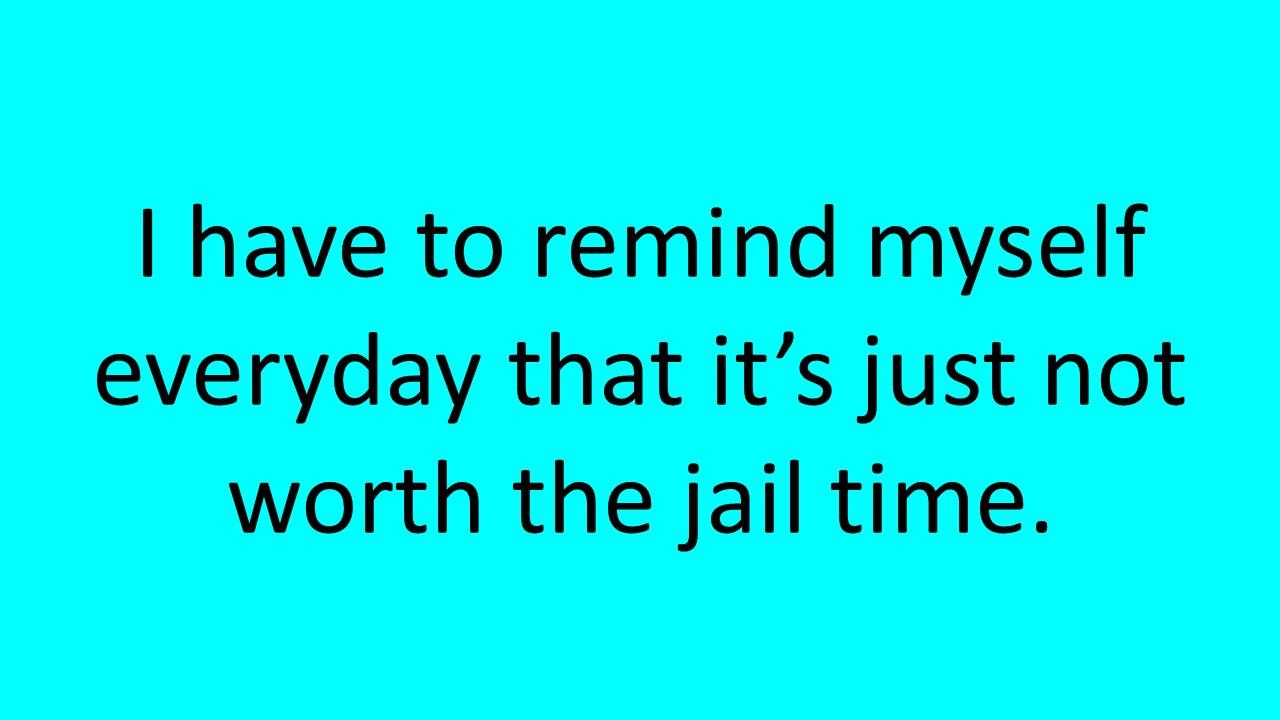
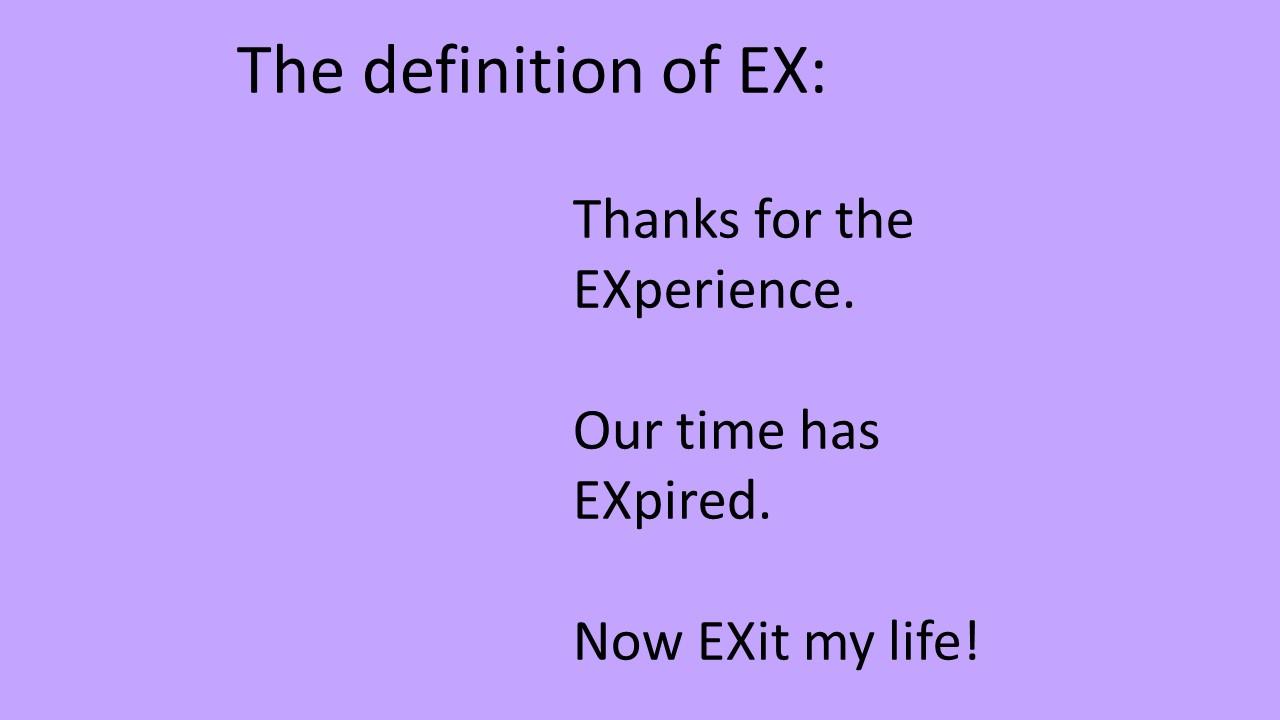
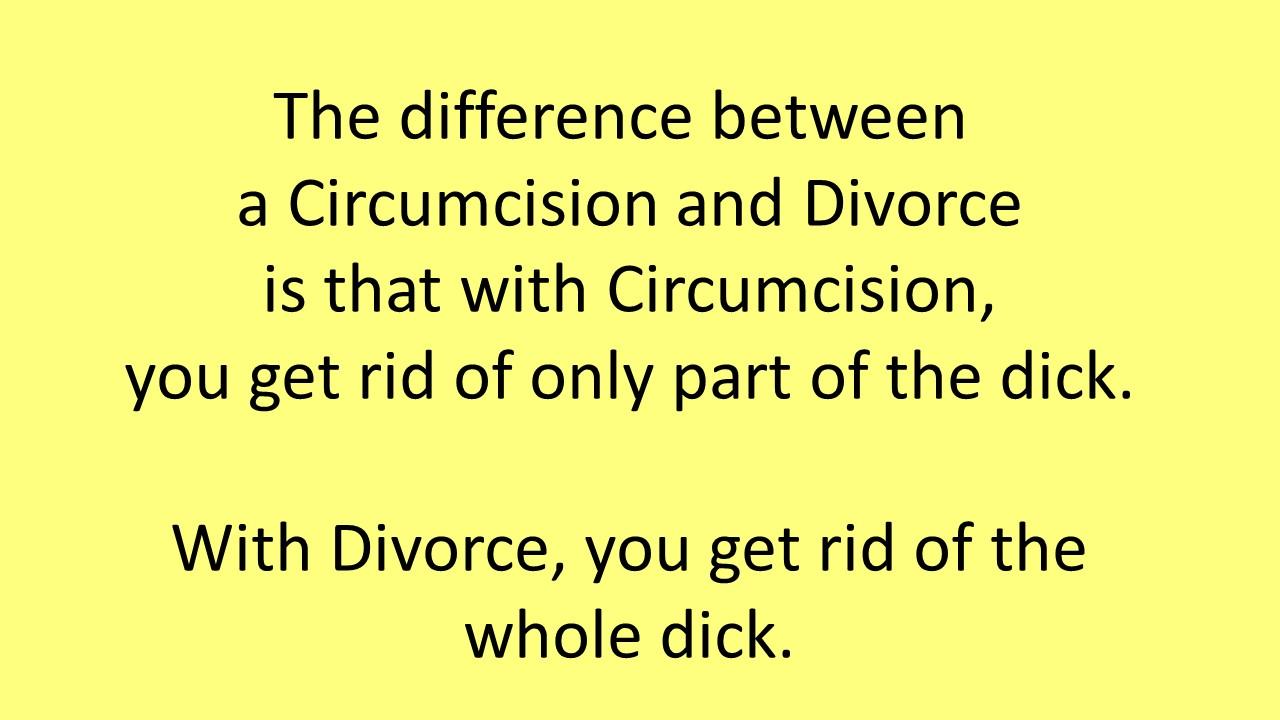

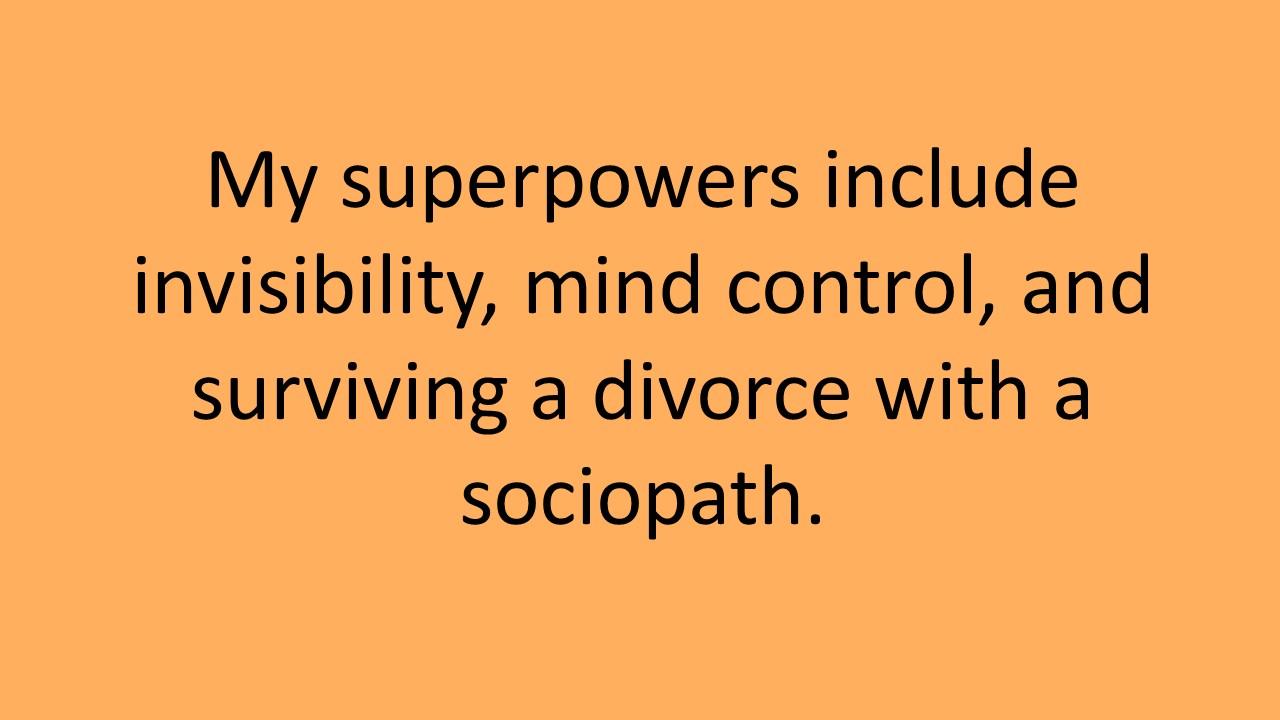

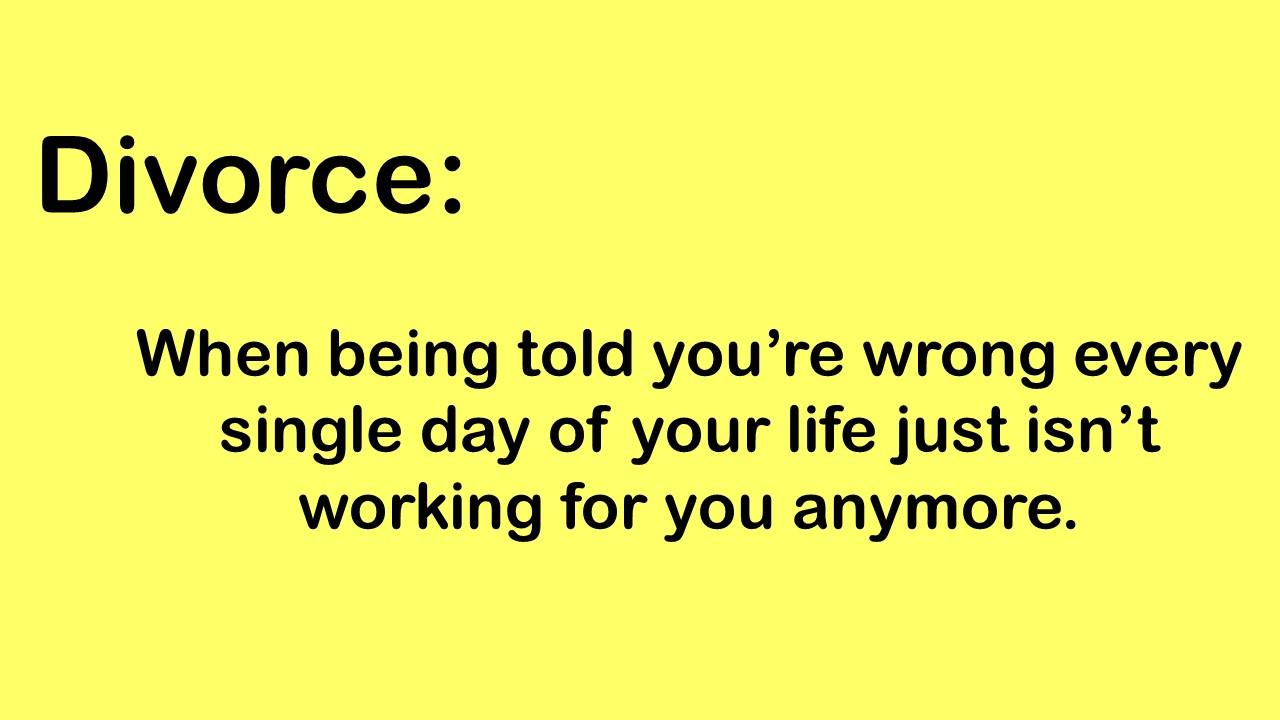

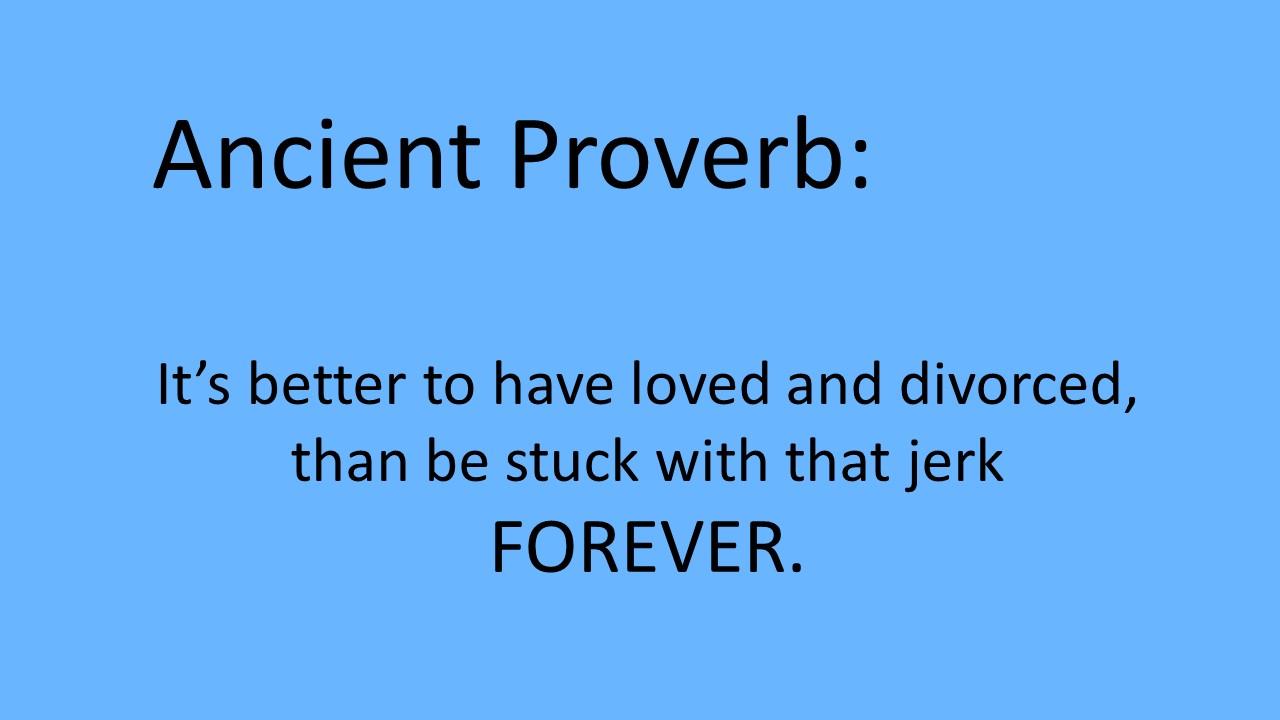
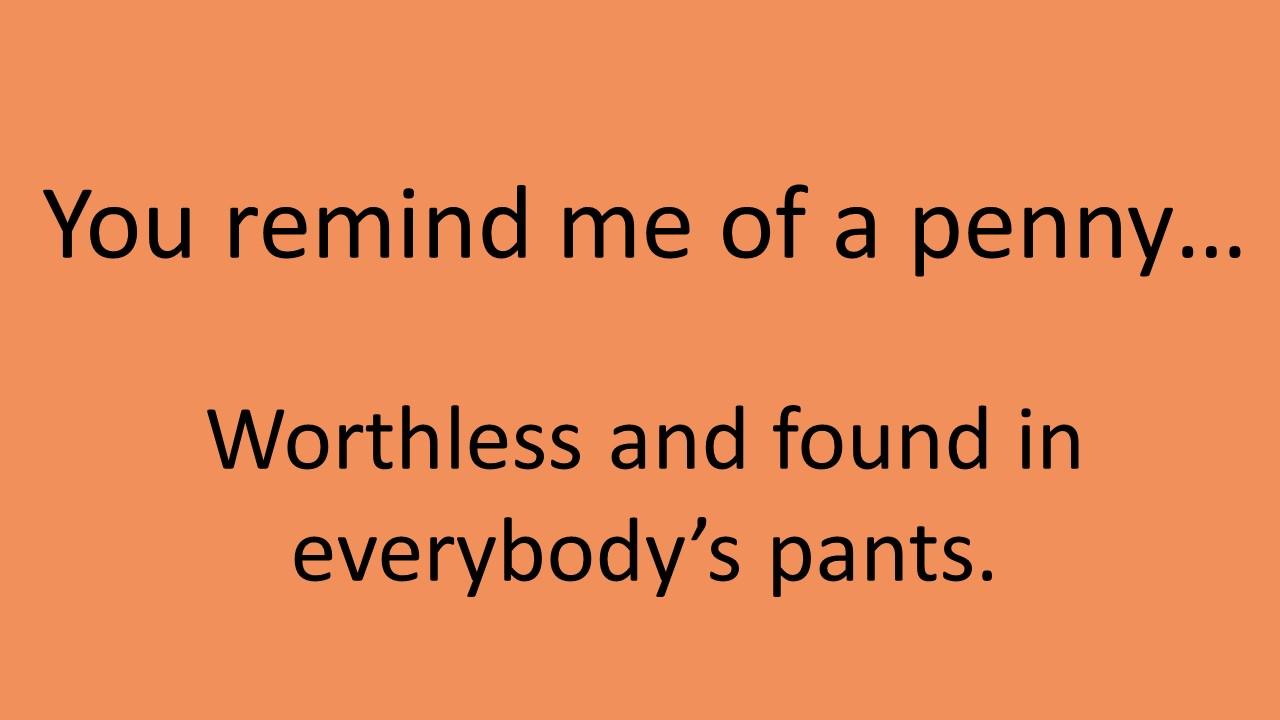
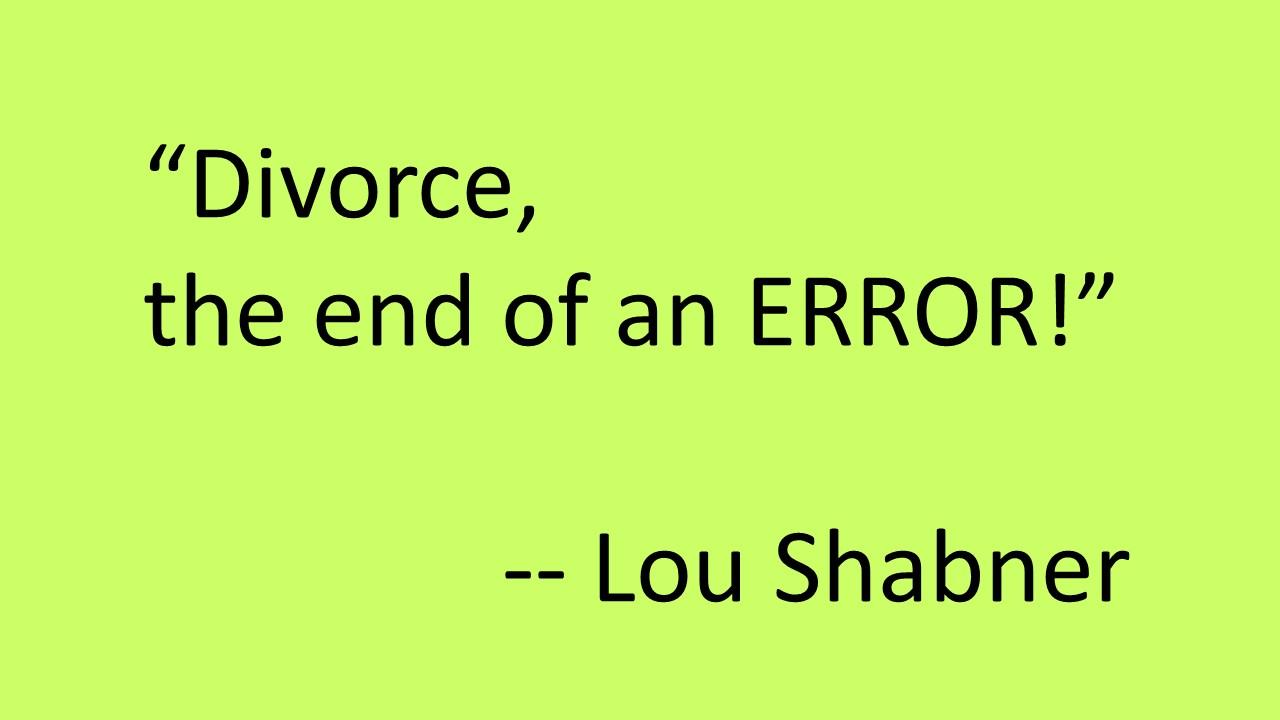
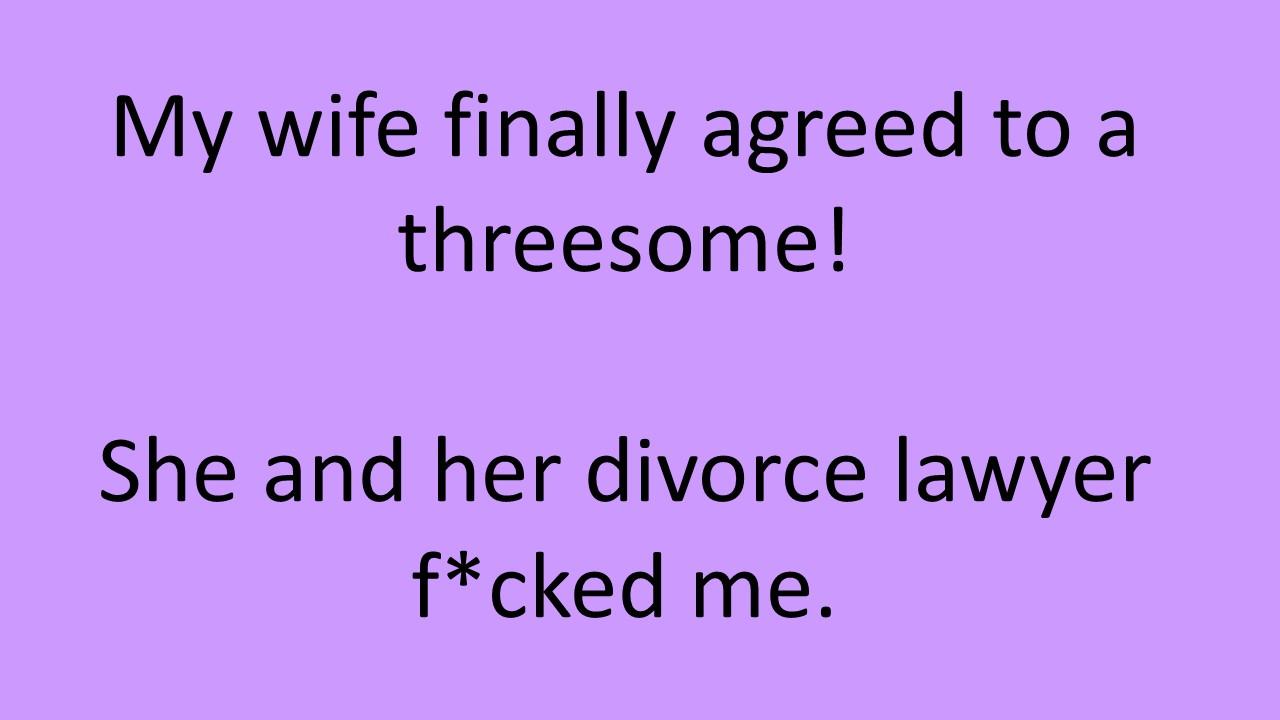

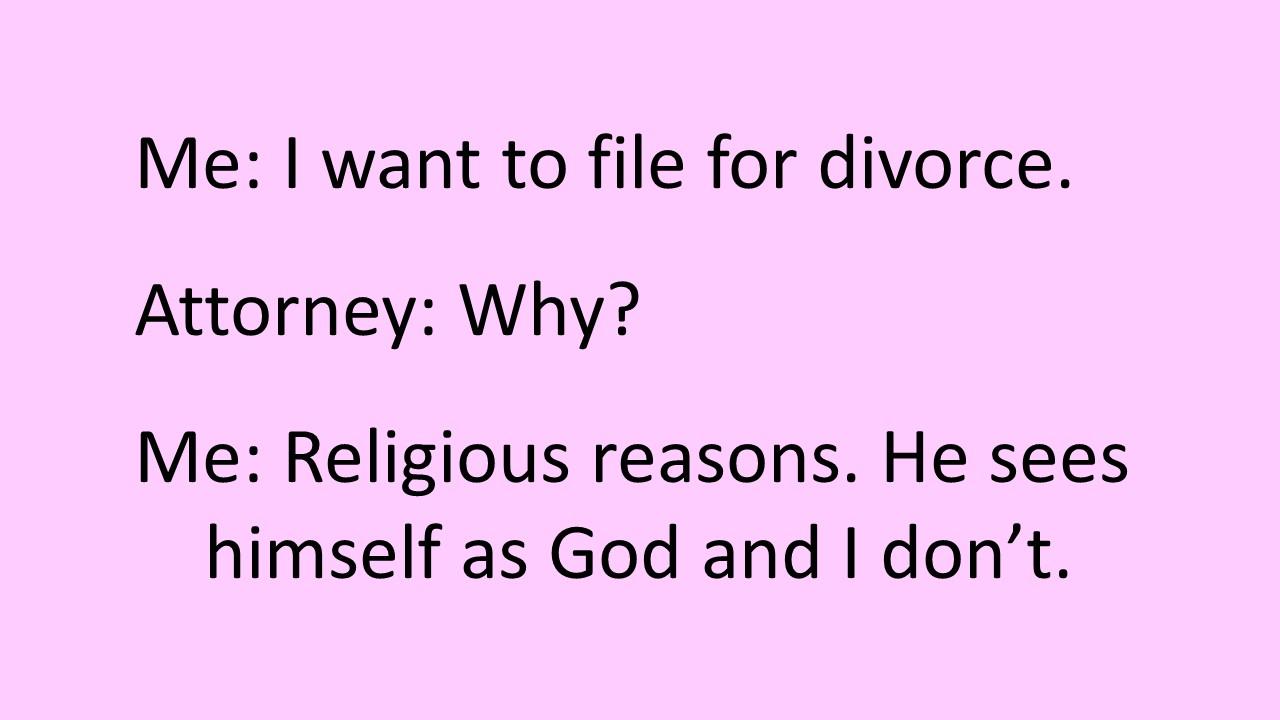
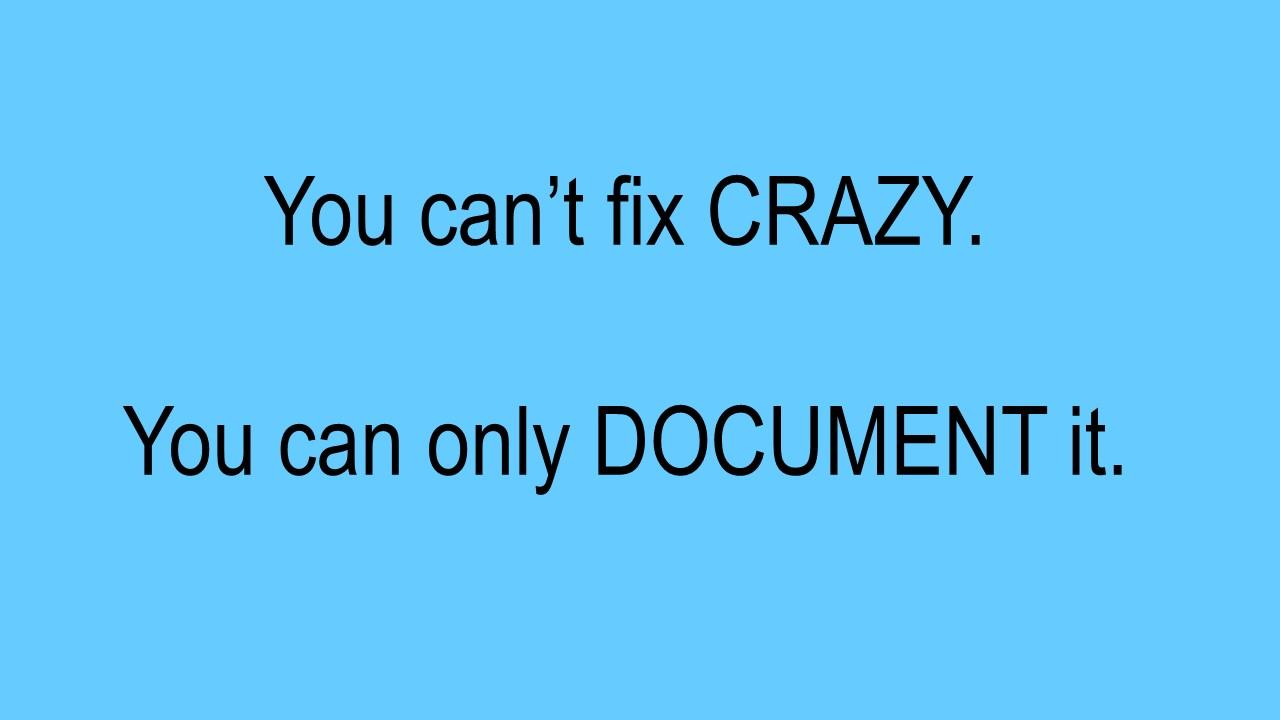
I’m Dr. Karen Finn, a divorce coach and advisor. I work with clients just like you who are struggling as they deal with fear and grief after divorce. You can join my newsletter list for free weekly advice. And if you’re interested in taking the first step toward working with me, you can schedule an introductory private coaching session.
Looking for more help to get over your divorce? You’ll find what you’re looking for in Dealing With Grief.
This article originally appeared on YourTango.
I Became My Own Divorce Superhero And Rescued Myself From Fear
Divorce scared the hell out of me. Until I decided to face that fear head on.
Numb and terrified. I spent so much time scared out of my mind after my divorce, worrying about what might happen to me. My nightmares were so bad, I hardly slept. And eating wasn’t happening much either, as I constantly felt nauseous and without an appetite. My thoughts looped around a racetrack, imagining one possible catastrophe that might befall me after another. I felt completely helpless to change any of it, but as strange as it sounds, I felt the best in moments when I could finally be numb.
They say that you have to hit rock bottom before you can make the hard choices required to truly change your life. For me to get through my divorce, that’s exactly what I needed—to hit rock bottom. Only then could I start to grasp the idea that I deserved to be free from the tyranny of my thoughts and fears, and that I had to choose to overcome them, no matter what. I realized at one point that there was no magic wand to be found, no fairy godmother on her way, no knight in shining armor about to sweep into my life and make everything all better. There was only me … very scared, very alone me.
So, I made a decision to become my own superhero and do whatever needed to be done in order to free myself from the clutches of fear that I had allowed myself to fall captive to in my life. No, I didn’t start wearing a cape or a sassy spandex outfit, but I did start showing up more boldly for myself, handling the things that needed to be faced in order to get through my divorce.
How did I start being my own superhero?
I realized (finally) that, as much as I wanted my therapist, or someone from my divorce support group, or one of my family members, or one of my friends to magically pull me free of the numbness and misery, they couldn’t. And it wasn’t their job to. Their job was to support me and point me toward helpful information along the way. My job was to pay attention to that information and start thinking differently so I could behave differently. My job was to realize that I was not a victim any longer (unless I chose to be). My job was to be the superhero of my own life.
Once I accepted that it was me and only me on the Karen Rescue Squad, I realized I needed to build my faith. For me, that meant putting my trust in something bigger than myself (or at least bigger than I felt at that particular time) that was also still part of me—in other words, God. Despite part of me being terrified that God was going to “smite” me because I was getting divorced, I still found a way to recite the first verse of the Serenity Prayer over and over again every time I found myself tossing and turning in bed. Over time, this prayer (which is about appropriate personal power) became a balm and a comfort to me. I began to sleep again—and sleep was something that I desperately needed.
Some might argue that my reaching out to God was still looking outside of myself for a rescuer, but that’s not how it worked for me. I wasn’t escaping. I used faith and God to help focus me and harness my inner power. By reminding myself that I came from something bigger and better, I felt strong enough to rise into bigger and better. And, in doing so, I began releasing myself from my prison of victimhood and using all of the resources and talents available to me.
As my strength grew, I was able to start hearing more of the helpful information people were sharing with me.
Because most people thought I was extremely fragile, they were afraid to be frank with me. Many people said things like “you’re looking thin,” but one friend loved me enough to be blunt, saying without preamble and quite simply, “You’re anorexic!”
When he said that, I panicked. I didn’t have an eating disorder (did I?). How dare he say that about me? I was furious and ran to the bathroom. A few women in there were thinner than me, which meant I was okay, right? Wrong. Although it was one of the hardest things for me to hear, deep down I knew my friend was right. I’m 5-foot, 5-1/2-inches tall and I barely weighed 100 pounds. I was able to shop in the children’s department for my t-shirts and had a hard time finding adult clothes that fit me. I was anorexic.
After about 10 minutes of coming to grips with what he said, I went back out to where he was patiently waiting for me. Despite my anger that was just covering up my intense fear, we were able to have a real conversation. I was able to commit to an eating plan that helped me start my road back to better nutrition. With the improvements in my sleep and getting better nutrition, I was able to think more clearly, emerge from the numbness and start to fully embrace my role as my personal superhero. But, there was still a lot to do.
I took stock of my strengths and weaknesses and realized that I’d been living my life to please others. It turned out that getting divorced was just the first in a long line of scary decisions I needed to make to rescue “me”. You may think once a superhero, always a superhero, and to some extent you’re correct, but each one of those scary decisions needing to be made were a challenge for me, requiring me to dig deep to find new stores of courage within myself. Each challenge was another chance to choose myself.
Even now, I still fall prey to a victim mentality from time to time. In those moments, I once again consciously choose to be a superhero, to step outside of my comfort zone, to resist blaming someone or something else, and to keep my eyes always searching for the good (because there is always good to be found) in even the most challenging situations.
I’m Dr. Karen Finn, a divorce coach and advisor. I work with clients just like you who are struggling as they deal with fear and grief after divorce. You can join my newsletter list for free weekly advice. And if you’re interested in taking the first step toward working with me, you can schedule an introductory private coaching session.
Looking for more help in getting over your divorce? You’ll find what you’re looking for in Dealing With Grief.
This piece was originally published at YourTango.com.
Struggling With Thoughts Of Reconciliation Post-Divorce?
Don’t worry, those thoughts are normal – whether they’re wanted or not.
They’re confusing, frustrating and add to the horrible mess of wondering if the whole divorce thing has finally driven you mad.
What I want you to know is that thoughts of reconciliation are completely normal when you’re dealing with grief after divorce.
So take a deep breath, relax knowing that you’re still sane as you read on to understand what’s up with those bizarre (and usually unwelcome) thoughts of reconciliation that are popping into your head.
Dealing with grief after divorce is a complicated thing. It’s lots different than dealing with grief after a death. Death is final. You’ll never look that person in the eyes again.
After divorce, you have the opportunity to look your ex in the eyes each and every time you hand the kids off and/or at each major event in the kids’ lives (think graduation, marriage, grandchildren, accepting a Nobel Prize, etc.). So finding closure after divorce is difficult and makes the whole dealing with grief thing more challenging.
Regardless of the grief you’re experiencing, you’re likely to go through the 5 stages of grief identified by Elisabeth Kübler-Ross:
- Denial and Isolation
- Anger
- Bargaining
- Depression
- Acceptance
Take a good look at 3. Bargaining. That’s what those thoughts of reconciliation and getting back with your ex could be about – especially if you’ve gone to the point of asking (OK, maybe it’s more like begging) your ex to take you back. And if so, they’re just a normal part of dealing with grief post separation and divorce.
Many people have fantasies of how their life would be if the divorce had never happened. They’ll start dreaming of getting back together with their ex.
When we’re in pain, our brains start doing what they’re fabulous at – problem solving! They’ll come up with all kinds of ideas (and, yes, some of them are really weird) for getting us out of that pain.
I had all kinds of strange thoughts when I was working through the grief of my divorce. One of the recurring (and thankfully fleeting) ideas I had when I was dealing with grief post-divorce was suicide. Other times I’d think about reconciliation. The thoughts kept coming and coming and coming and coming.
Obviously some of the ideas I came up with were better than others. It took real effort to sort through all of them. And I’ll bet you’re experiencing something similar.
With all of those ideas your brain is coming up with about how to solve the pain of dealing with grief, it’s really easy to start seriously considering reconciliation as a viable option. And the reason it’s so easy is because we all have a tendency to view our pasts with rose-colored glasses. According to Richard Walker, Ph.D, “People have an inherent bias to view their experiences in a positive light.”
What Walker discovered after reviewing 12 different studies is that we all tend to remember happier emotions longer than negative ones. The negative ones just tend to fade faster. (Unless a person suffers from depression, then both their positive and negative emotions fade at the same rate.)
So, as time goes by, it’s easier to remember the good times in your marriage than it is to remember the bad times. And this fading effect can make the idea of reconciliation much more palatable.
Finally, you might be thinking about reconciliation because the divorce was the kick in the pants you needed to want to put in the effort to fix the issues that caused the divorce. (If that’s the case, then you’ve got A LOT of work ahead of you.)
For most of us, dealing with grief post-divorce is one of the most excruciating experiences we’ll ever face. We feel like we’re the only ones going through all of the confusing and conflicting emotions – not to mention the worries about whether or not we’ve lost our sanity along with our marriage.
But thoughts of reconciliation being better than continuing to deal with the grief and healing after divorce are common and normal. So just get curious about which of the causes above are really behind the thoughts and you’ll be able to deal with those thoughts of reconciliation in the midst of dealing with grief more easily.
I’m Dr. Karen Finn, a divorce coach and advisor. I work with clients just like you who are struggling with dealing with grief after their divorce. You can join my newsletter list for free weekly advice. And if you’re interested in taking the first step toward working with me, you can schedule an introductory private coaching session.
Looking for more help in getting over your divorce? You’ll find what you’re looking for in Dealing With Grief.
How You Can Break Through The Soul-Crushing Loneliness Of Divorce
Leave the loneliness of divorce behind by doing things you love.
Being suddenly single may seem like a dream come true to those in an unhappy marriage, but to anyone who’s going through divorce being suddenly single is devastating.
The depth of the loneliness of divorce is almost beyond description. You exist in the world, but you don’t feel a part of it. You feel isolated. Somehow connection remains frustratingly beyond your reach because now you’re different from the rest of the world (at least the world you knew when you were married).
Despite the misery of your exile and the desperate loneliness of divorce you’re experiencing, it is self-imposed. And that’s a good thing!
At first you isolated yourself because of the extreme pain you were in as a result of your marriage ending. You played it safe and leaned on your existing friends – those people who knew you before. (It’s natural to protect yourself like this after divorce.)
But now you’re facing a different problem. Sure, the pain is still there, but instead of continuing to feel safe with these friends, you’re feeling separate and unlike them.
And the reason you’re feeling separate now is that is they’re married and you’re not. Now you don’t fit in as well as you used to – not necessarily because of anything they’ve done, but because you’re not the same. (Divorce does that to a person.)
You’re coming to grips with the fact that your life as a suddenly single person is different from the life of a married person. And you wonder desperately if there’s anyone else who could possibly understand the realities of your new life.
The answer is emphatically “YES!” There are lots of people who understand (and at a very deep level) what you’re experiencing. They’re other suddenly single people.
The good news is YOU are capable of ending your exile. It will just take a little bit of effort on your part.
So what’s really involved here? You get to get a bit uncomfortable and put yourself out there in a safe and easy way. And, no, I’m not talking about dating. I’m talking about making friends.
The first place to find new friends who will get what you’re going through as you struggle to emerge from the loneliness of divorce is a divorce support group. These groups exist to provide structure and support for anyone who’s ready to heal from their divorce. Some groups meet in person and others meet virtually.
You’ll be amazed at the friendships you can develop with the other group members! The friendships blossom in these groups because you’re each facing the same challenge. You each get it and there’s little to no fear of saying what you’re really going through. It’s this built-in acceptance that make divorce support groups such a great place to start meeting new people.
Another place to look for new friends is MeetUp.com. Now I’m not talking about heading to MeetUp.com to find singles groups. (Although there are plenty of those groups there.)
Instead, look for groups that do what you enjoy doing. Maybe you can find a single-parent’s group or a hiking group or a yoga group or a book club or a … I’m sure you get the idea. MeetUp.com has an amazing array of groups that get together to do fun things.
Then, after you’ve met some interesting people in your divorce support group and/or on MeetUp.com, put together a group event (think dinner, lunch, coffee, a movie). When you organize an event, you’ll naturally be seen as incredibly interesting and those who make it to the event will want to get to know you better too! It’s a sure-fire way to expand your group of friends.
Now I know this is simple to read, but that it takes effort (and time) to actually break through the loneliness of divorce and start building new friendships. All I can tell you is that you’re worth it and hope that you’ll put forth the effort and find the time.
The pay-off is that when you choose to stop living a half-life, you’ll be surprised by how full and fun your suddenly single life can actually be. And once you discover your new place in the world, you’ll quickly put the memories of your loneliness of divorce far behind you.
I’m Dr. Karen Finn, a divorce coach and advisor helping people just like you who are ready to break through the loneliness of their divorce and start living their life to the fullest again. You can join my newsletter list for free weekly advice. If you’re ready to take the first step toward working with me as your personal coach, you can schedule an introductory private coaching session.
Looking for more help creating a meaningful life after divorce? You’ll find what you want in Life After Divorce.









